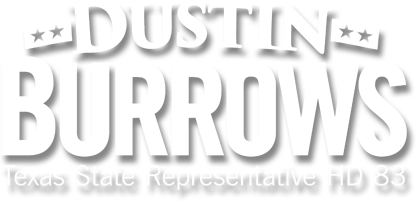By: Asher Price
The head of a Texas House committee overseeing marquee GOP legislation to constrain property tax increases said Wednesday that he was open to shifting the bill in whatever direction gets it “right.”
Hoping to “make the bill better in either direction,” state Rep. Dustin Burrows, R-Lubbock, chairman of the Ways and Means Committee and author of the proposal, said he thinks the “committee can collaborate to get something that’s right — not just get something across the finish line as quick as we can.”
That ecumenical approach included, perhaps, an implicit swipe at the Senate Property Tax Committee, which hustled its version of property tax legislation out the door earlier this month by a 4-0 vote, with the committee’s sole Democrat abstaining. That bill has yet to reach a vote on the Senate floor with opposition from a key Republican senator.
The decision by Burrows to opt for a slower rollout in the House reflects the broader posture of the Texas House — the more closely divided chamber — to more closely wed property tax legislation with school financing.
“They work in tandem, they’re married,” Burrows said.
House Bill 2 would require taxing districts with $15 million or more in combined property and sales tax revenue to obtain voter approval for property tax increases that lead to collections more than 2.5 percent higher than those in the previous year, not including new property on the appraisal rolls.
Currently, state law allows local governments to collect 8 percent more in property tax revenue before they can be forced by petition to hold an election. Local officials have said the tax proposals would hamstring their ability to provide everything from emergency services to park maintenance.
The House two years ago approved a 6 percent property tax cap 105-41, with most Democrats opposing it. The Senate approved a 4 percent cap in 2017. But leaders of the two chambers couldn’t reach a compromise and both measures failed to reach Gov. Greg Abbott’s desk.
This year, Democrats hold 12 more House seats, and they have said they want to focus on sending more state money to schools. And some rural Republicans have suggested the 2.5 percent cap is too restrictive.
The Senate has taken much the same approach as last time around, acting swiftly and forcefully.
During a contentious hearing, Senate Property Tax Committee Chairman Paul Bettencourt, R-Houston, tweaked some of the witnesses at his committee’s hearing, asking local officials why they were against property tax relief for their constituents. The mayor of McKinney, the county seat of conservative Collin County, accused him at one point of taking cheap shots from the dais.
Back-and-forth with local officials was far less prickly for the House committee on Wednesday, with Burrows asking people like Ginger Nelson, the mayor of Amarillo, whether she thought the rollback rate ought to be 8 percent — or closer to the 2.5 percent in his bill.
She told him she had to mull over more closely the consequences of different tax rate constraints.
And the hearing simply moved on to the next witness.
“My sincerest hope is that we get ideas from all across the spectrum to deliberate on,” Burrows said at one point. “My goal is to work with all the members of the committee to try to see what we can sort out.”
Burrows got praise at the outset of the hearing — which had at least 130 people sign up to testify, ranging from taxpayers angry about their property tax bills to mayors suggesting property tax restraints could harm their public safety budgets — from state Rep. Eddie Rodriguez, D-Austin, for having an open mind to talk about property tax matters.
The wonky tone was set early on with lengthy testimony by Dale Craymer, head of the Texas Taxpayers and Research Association.
Craymer said his group was neutral on the bill.
As far as transparency and simplifying of tax bills and appraisal valuations, the “body of this bill is more far-reaching than anything we have had the opportunity to work on before,” he said.
But his group was not endorsing the bill as written because “we think that (the 2.5 percent rollback rate) is probably too low. It’s appropriate to give (taxing) jurisdictions more flexibility than that.”

